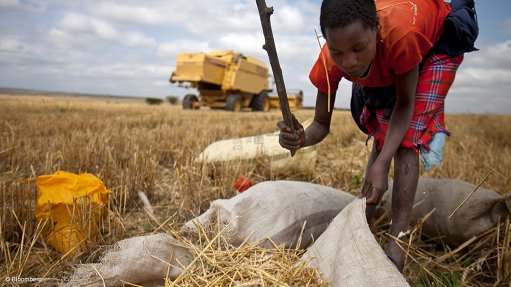
Photo by: Bloomberg
Speakers participating in an agriculture-focused panel at the second yearly Vision 2030 Summit, on Thursday painted an image of smallholder farmers battling out the current slump that threatens their survival.
Discussing the challenges facing small-scale farmers in South Africa, Three Star Farming executive director Junior Ndweleni Makhado said these farmers were battling a myriad of obstacles that hampered their growth.
Hit by a drought that left most farmers unable to harvest since late last year, along with difficulty accessing finance and ever-increasing production input costs, partnerships would be key in enabling smallholder farmers to gain traction and build the critical mass to enable viability in a muted environment.
A lack of water, skyrocketing electricity bills, infrastructure and transport challenges, barriers to market and affordable finance and severe cash flow deficits were just some of the challenges faced by small-scale farmers in South Africa, particularly those in the rural areas.
Department of Agriculture, Fisheries and Forestry (DAFF) smallholder development director Roger Tuckeldoe commented that the economy was under pressure, several sectors were “suffering” and many industries were shedding jobs, which contributed to the difficulties confronting farmers.
With the cost of capital increasing, the instability of labour, limited, and in some cases, no availability of water, besides others, the challenges were major.
“You can go on and on about the challenges in agriculture,” he pointed out, noting that a conducive environment, with implementable policies, was required.
With government and industries fully aware of the environment in which the farmers operated, there was also a need to examine potential strategic partnerships.
However, there were “good” and “bad” sides to partnerships, which always came with a number of “teething” problems, he added.
He indicated the need to be selective, as government only had so much funding available and infrastructure and development were costly exercises.
Exacerbating the difficulties was a lack of good quality contact with the correct government officials and departments, with lengthy application processes that hampered access to aid also emerging as a significant challenge facing rural farmers, said Makhado.
To this end, the DAFF was working to draw closer to rural smallholder farmers and unlock the assistance required, including the development of “agriparks” across existing agricultural development corridors.
According to the department, the agriparks programme was aimed at addressing the challenge faced by smallholders in accessing markets and would become the “point where smallholder producers’ production would be integrated, collated, packed and processed” to enable their participation in the value chain.
The farmers also needed to be competitive, which funding and access to affordable finance could help unlock.
Meanwhile, the Department of Trade and Industry on Thursday, in a separate announcement, said it was focusing on the development and revitalisation of critical agroprocessing infrastructure.
“As part of the implementation of its critical agroprocessing infrastructure support programme, the department is in the process of engaging stakeholders around critical enabling infrastructure for smallholder farmers, producers and processors,” the DTI said.
This was expected to narrow focus on market-enabling facilities, particularly for marginalised economic stakeholders.